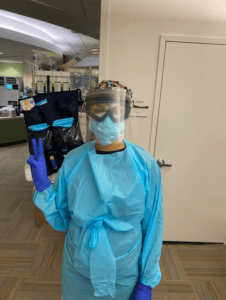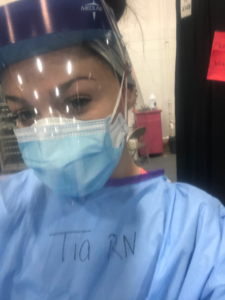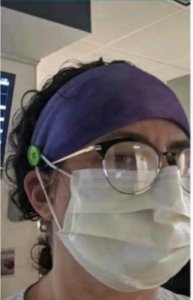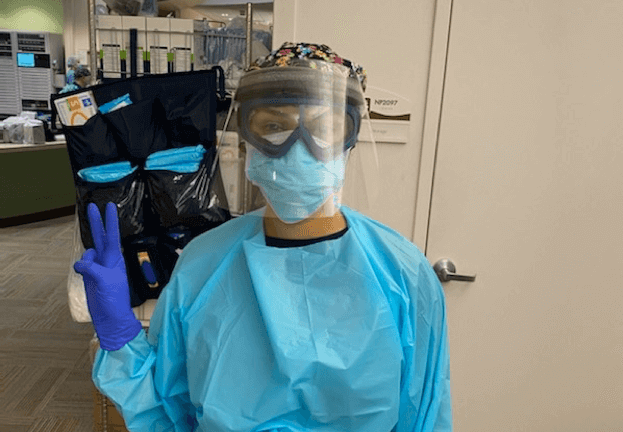Ambika Alagona and Tia Romeo ’18 Share What Daily Life is Like for Nurses Fighting COVID-19

Ambika Alagona, a master’s degree candidate in the university’s nursing program, is currently facing the COVID-19 pandemic firsthand as a nurse in the intensive care unit at Hackensack Meridian Jersey Shore University Medical Center.
Alagona—who entered Monmouth’s master’s program as a registered nurse—had the ICU skills that are crucially needed during the novel coronavirus pandemic. “Most of the COVID-19 positive patients are in intensive care needing ventilation and titration of medication to stay alive,” Alagona said.
Her normal work week is around 60 hours, where she cares for critically ill COVID-19 positive patients around the clock.
Alagona explained the sobering experience of working in an ICU during the outbreak.
“The sadness that surrounds being alone in a room unable to make decisions, [with] no one to hold hands with, and no family to support you through this long painful journey is the picture I see every day I care for a critically ill COVID positive patient,” Alagona said. “If loneliness could be painted, that’s what I see on a day-to-day basis.”
While Alagona works in a traditional hospital setting, Tia Romeo ’18 is working at the COVID-19 field pop-up hospital in the Meadowlands Exposition Center in Secaucus, New Jersey. She received an email two months ago from the New Jersey Division of Consumer Affairs asking for the help of available nurses. She also received emails, texts, and phone calls from fellow nurses with applications to the COVID field hospitals and testing centers that would be opening in New Jersey. “I sent my resume out and heard back from an agency right away,” Romeo said.

Romeo describes her days as ever-changing. “Because this is a pop-up hospital, policies and procedures are changing every hour. We as nurses need to be flexible and willing to change our routine to fit what the hospital needs at that given time,” Romeo said. “What is standing out the most to me is how teamwork is necessary to keep the hospital running smoothly and how dramatically teamwork is needed to keep our patients alive and recovering. I’ve worked with different national guard ranks, doctors, nurses, LPNs [licensed practical nurses], respiratory therapists, and physical therapists each day and every single person is on their A-game and always willing to help.”
As of right now, Romeo said she has the proper personal protective equipment, or PPE, to stay healthy and reduce the risk of transmission. “We put surgical masks over our N95s to preserve them for the day. It is becoming more and more evident that we are running low on certain items such as gowns and N95s, which must be removed before entering ‘cold zones’ on the floor. Otherwise, this equipment stays on us for 12-plus hours a day.”
During this time, Romeo is reminded of a PPE relay race, where fellow Monmouth undergraduate students would race to see who could dress themselves the fastest in protective gear.
“The one thing that is stuck in mind is the PPE relay race. When I enter the floor, it takes me half the amount of time to get my PPE on than everyone else,” Romeo explained. “Along with this, our very first hand washing lesson has become second nature. Learning how to determine who is most critical has also helped me in determining which patient I absolutely need to see first, and who I can wait to see until all my other priority work is complete. Monmouth University’s nursing staff and clinical instructors gave us the knowledge we needed to be nurses in the real world.”
Romeo also stressed the importance of remembering that these patients are alone. Due to the high transmission rate of the novel coronavirus, visitors are not allowed.
“We need to be empathetic towards their situation. Imagine a whole team of people coming into your room in full gear—gown, booties, an N95, a surgical mask, a face shield, and gloves. It’s a lot to handle,” Romeo said.
“Most of these patients are anxious, upset, scared and fearful of what’s to come; it’s important for us to sit and talk to our patients, even if it’s only for a few minutes. We are all they have right now. They need to know that someone is listening to them, that they have that outlet to let out their thoughts and emotions. They are very sick, they need our help, and we signed up to help people, all people, no matter what.”
University Nursing Students and Faculty Show Their Support

While Monmouth nursing students and alumni continue to provide care to COVID-19 patients, Paige Huff, an undergraduate nursing student and secretary of the Monmouth University Professional Nurses Association (MUPNA), spearheaded a fundraiser in support of Monmouth Medical Center’s emergency relief fund. The association raised more than $1,300 that will be used to purchase food, drinks, and other supplies for working nurses.
Many Monmouth students have done clinical rotations with those who are now on the front lines of the COVID-19 response, according to Beth Gough, MUPNA faculty advisor and specialist professor of nursing. “This is a small way to thank these brave professionals who have been an important part of our students’ education. Our students are grateful for the knowledge they [Monmouth Medical nurses] shared during their clinical rotations. They now want to bring some joy to them in return.”
MUPNA students and nursing faculty have also been making special headbands for nurses to ease some of the discomfort from wearing personal protective equipment for extended amounts of time.
“You have fed our minds as nursing students and now it’s our turn to help nourish you while you remain at the heart of this battle against the COVID-19 pandemic,” read a note from university students and faculty that accompanied donations sent to the Monmouth Medical nurses. “You have all been so wonderful to us as nursing students at Monmouth University. The lessons we’ve learned alongside you already we will carry throughout our careers. You have made an indelible mark on all of us.”

